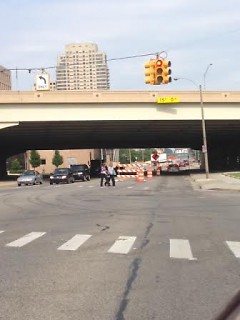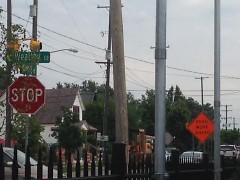Road work has been underway since the May 6th approved ballot initiative. The planned road work is planned to extend well into next year with future dates to be announced in time. Grand Rapids has set the following timeline for construction, which can be seen here.
Grand Rapids has a few different types of construction plans being completed. The city has some sewer and water lines being replaced, resurfacing a large number of roads and even reconstructing some roadways.
In order to finance the new road and sidewalk projects Grand Rapids will extend a 1.5% income tax for an additional 15 years.
Another major change that will be taking place is the shift of responsibility of sidewalk repair from individuals to the city.
According to a media release from Grand Rapids city it is reported that the city will need 22 million dollars per year for the next 15 years to get to the 70% fair street rating. That money will not be completely covered by the extended income tax, but instead will have to be supplemented by state and Federal aid.
A Michigan legislative bill would potentially appropriate 7.5 million dollars to Grand Rapids neighborhoods for roadwork funding. The state is considering collecting the gas tax on wholesale instead of by gallon in order to receive funding needed for road projects.
However, there is concern about the general collection of said state funding.
Josh Leffingwell, member of the Sustainable Streets Task Force and director of the West Michigan Environmental Action Counsel, discusses the potential problems of the proposed road repair.
“What we need just begin funding roads at a full level as they have in the past.
These stipends are causing more problems,” says Leffingwell.
The reliance on State funding for roads can be problematic when trying to make tentative road work schedules. The road funding also tend to have many stipulations attached to them, meaning that some of the money may be earmarked for certain types of projects.
However, it presents somewhat of a catch 22.
“Without that State commitment we won’t be able fund the improvements we overwhelmingly want,” explains Leffingwell.
With Grand Rapids adding many more trees and approving bike lanes, it raises questions of why the city would continue to build these things while the roads stand in such disrepair.
“If it costs a million dollars to build a portion of street, it is 1 to 3 thousand dollars to make the bike lane. That cost is not a factor. About a third of the city doesn’t drive.
The bike lane reduces wear and tear on a road,” retorts Leffingwell.
He went on to explain that bike lanes reduce wear and tear by extending the shoulder of the road and helps prevent cracks from easily extending into the main road. He also explains that by planting trees the roads will be getting hit by less water, which in turn slowly erodes the surface of the road. Trees also produce shade to help keep roads at a more consistent temperature, which helps further protect the roads.
Leffingwell does give credit to the city engineers. The city engineers go around and use equipment to monitor all the roads. A presentation about the condition of the roads is here.
“It might be one of the best ones in the state,” says Leffingwell about Grand Rapids plan to keep the roads intact.
Grand Rapids does have a plan for road repair. The plan to get Grand Rapids roads in fair condition by 2030 is underway, now all there is to do is sit and wait.
The Rapidian, a program of the 501(c)3 nonprofit Community Media Center, relies on the community’s support to help cover the cost of training reporters and publishing content.
We need your help.
If each of our readers and content creators who values this community platform help support its creation and maintenance, The Rapidian can continue to educate and facilitate a conversation around issues for years to come.
Please support The Rapidian and make a contribution today.


